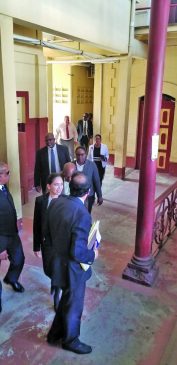 The Georgetown Magistrates’ Courts on Tuesday threw out contempt of court charges against eight top executives of the Guyana Bank for Trade and Industry Limited (GBTI), saying the bank’s officials should not have been charged in the first place.
The Georgetown Magistrates’ Courts on Tuesday threw out contempt of court charges against eight top executives of the Guyana Bank for Trade and Industry Limited (GBTI), saying the bank’s officials should not have been charged in the first place.
The matter was brought by the Special Organised Crime Unit (SOCU) against GBTI and its Board of Directors. This case stemmed from the matter in October 2017, when SOCU charged the bank’s directors with contempt based on the advice of the Director of Public Prosecutions (DPP).
The contempt proceedings stemmed from the bank’s failure to comply with a production order made by acting Chief Justice Roxane George on August 29, 2017.
The bank had contended in its application for the variation of the order granted by Justice George that countless efforts were made to gather all the documents requested but it was discovered that some were either destroyed or could not be found.
The documents are pertinent to the ongoing US$500 million Guyana Rice Development Board (GRDB) probe being conducted by SOCU. The bank’s failure to hand over the documents has assisted in stalling the probe and has since led to a clash between GBTI and SOCU.
On Tuesday, Magistrate Ann McLennan dismissed the case and a no-case submission was upheld by the court. The Magistrate ruled that the prosecution failed on several counts, but the critical points were that at the time of the complaint there could not have been failure to comply with the production order because the date for compliance had already been extended by the High Court, and that the prosecution failed to tender all of the documents provided to SOCU by GBTI.
The High Court had issued an order instructing the company to provide the information. When the company failed to do so immediately, SOCU filed the contempt charges.
McLennan said that in her opinion, the directors should not have been charged since the court had already granted them more time to provide information based on a SOCU investigation.
During the initial hearing, Attorney Nigel Hughes who represented the eight accused, told the court that the move to the court was nothing more than an abuse of prosecutorial power. He stated that his clients were following the court’s order and had been granted an extension by the Chief Justice to turn over all the relevant information to the SOCU.
Further, Hughes stated that the order was handed over to SOCU, but the unit chose not to acknowledge it. He said the court order by the Chief Justice was directed to the bank and not necessarily its directors. However, SOCU is contending that the bank failed or stalled and gave all kinds of excuses, and even destroyed pertinent records relating to GRDB.
The bank had made an application before the acting Chief Justice to be relieved from the production of the documents that were referred to in matter, on the grounds that they have either been destroyed by the applicant after the applicant’s retention period had expired, or they have been lost and cannot be found despite diligent efforts to find them.
The bank is said to have an internal policy with regard to the retention of documents for its customers, however, the Anti-Money Laundering and Combating the Financing of Terrorism (AML/CFT) legislation provides for banks and or financial institutions to maintain records for their customers up to a period of 10 years.
In a statement following the decision, GBTI said despite the ongoing public war of words against it, which seemed designed to “sully the esteemed reputation of the distinguished members of the Board and the financial institution they represent, the Bank is grateful that this malicious attack on its integrity and that of staff has been brought to a predictable end in the court.”
It stated too that while this unwarranted attack and abuse of power was not without severe and widespread consequences to the sterling institutional image and that of the personal reputation of distinguished directors and staff, GBTI withstood the onslaught with customers rallying around in support.
“GBTI wishes to express its gratitude to so many customers and friends who expressed their support in so many ways through this traumatic, shameful charade. To the attorneys who distinguished themselves by the highest standards of legal representation possible we are duty bound to publicly congratulate each of you.”
Related posts
-

Ramkarran says GECOM’s 15-day deadline to announce results “not mandatory”
The 15-day deadline referenced in the Representation of the People Act, within which the Guyana Elections... -

Linden man knifes woman and lover to death in jealous rage
A man is in Police custody after he reportedly stabbed his ex-lover and her new spouse... -

Mottley says “there are forces that do not want to see votes recounted”
Chairperson of the Caribbean Community (Caricom), Barbadian Prime Minister Mia Mottley, in a strongly-worded statement said...
